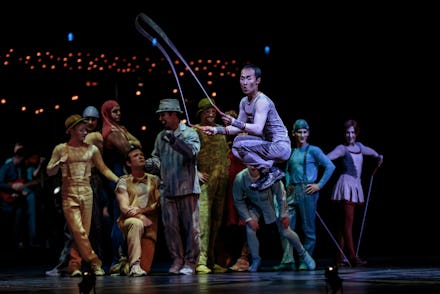Cirque du Soleil's bankruptcy is bad news for the future of live entertainment

Aside from a few troubling exceptions, the live entertainment industry is essentially on hold for the time being. Coronavirus cases continue to reach new single-day record highs in the United States, so there’s little reason to think that concerts or other large-scale gatherings will resume under normal conditions for a very long time. And while musicians and filmmakers are still able to reach audiences at home, for the rest of live entertainment — think the sorts of acts that win or finish as runners up on America’s Got Talent — the coronavirus is threatening to be an extinction-level event.
Case in point, on Monday the acrobatics powerhouse Cirque du Soleil announced that it has filed for bankruptcy, citing “immense disruption and forced show closures as a result of the COVID-19 pandemic.” Around 3,500 employees were furloughed, and the company reportedly remains roughly $1 billion in debt. Its current private equity owners, TPG Capital, have already reorganized to retain 55 percent ownership and raised an additional $300 million.
The Montreal-based organization plans to restructure its debt, with assistance from the Canadian government and other private equity firms. Cirque du Soleil CEO Daniel Lamarre is optimistic that shows will return by early 2021 in Las Vegas, and says the company can break even with just 40 percent capacity. “The good news is all of our cast and crew in Las Vegas lives there, so that’s why we’re hopeful that we can open Vegas first because the artists are ready to go, so within a couple of weeks of training and rehearsal, a show can be back on track,” he said Tuesday on CNBC. Lamarre’s less hopeful for touring shows, and imagines it could take the company at least two years to reach pre-COVID levels of profitability.
Cirque du Soleil isn’t the first marquee live entertainment staple to suffer immense losses from the pandemic. The Harlem Globetrotters, another eminent touring show, furloughed nearly 200 workers back in April. Broadway is shut down until at least early 2021, with three shows already ruling out a return when productions come back. The parent company behind Disney on Ice and Monster Jam events laid off more than 1,400 workers in April. As of last month, the pandemic had led to temporary layoffs of nearly 60,000 MGM Resorts workers, which could become permanent by August. For many of the Vegas staples like Cirque du Soleil that also have international touring arms, there just isn’t an audience eager to replicate the experience at home. Sure, you can order a Cirque du Soleil DVD compilation on Amazon, but who would want to?
Las Vegas, arguably the epicenter of the live entertainment industry, has nonetheless surged ahead with reopening plans despite a weekend spike in new cases. And while resorts are enforcing mask-wearing and sanitation among their employees, patrons haven’t been so careful. Caesars Entertainment confirmed on Saturday that one employee died after testing positive for COVID-19, and sent a small number of employees on paid leave to isolate. The concerns are widespread for the entire industry of casino workers, with Vegas hospitality workers filing a lawsuit against Harrah’s, Bellagio, and MGM Grand Casinos over failing to provide adequate protection.
In the absence of a vaccine, it’s hard to imagine a scenario in which large-scale entertainment can safely resume in Las Vegas, or that city and state officials will have the patience to ensure that the necessary safety hurdles are cleared before they charge forward anyway. Casinos and other large venues are currently capping crowds at 50 percent capacity, which evidently isn’t enough to curb a surge in new cases. Each new false start — in Vegas and every city in America — will only push a company like Cirque du Soleil into more wobbly territory, while regarding public health as a secondary concern.